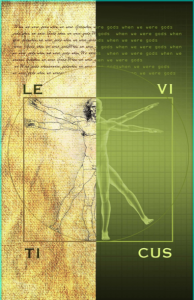 Leviticus by Daniel Seltzer, the first book of the When We Were Gods trilogy, is the mental autobiography of behind-the-times Levi Clayton “Clay” Furstman, an individual with a solitary streak to his existence that causes him to examine everything about himself and the world in an increasingly “outsider” perspective as he ages, and the world moves in directions he finds questionable – and often saddening – as technology overcomes what he believes to be common sense and the very essence of what it means to be human and to enjoy a fulfilling and social existence.
Leviticus by Daniel Seltzer, the first book of the When We Were Gods trilogy, is the mental autobiography of behind-the-times Levi Clayton “Clay” Furstman, an individual with a solitary streak to his existence that causes him to examine everything about himself and the world in an increasingly “outsider” perspective as he ages, and the world moves in directions he finds questionable – and often saddening – as technology overcomes what he believes to be common sense and the very essence of what it means to be human and to enjoy a fulfilling and social existence.
A plot dwells behind this about a revolutionary scientific nano-machinistic discovery that comes to change everything that Clay thought he knew, and gradually descends into the start of a new take on life as we know it. The book contains long drawls of introspection on both real events and the fictional future extrapolated from those events into Clay’s plodding mid-to-later life as one of the few remaining employed – and to him, reasonable – citizens, walking about from his law firm, home life, work life and around the city in general.
The main issue with the book presents itself slowly but surely during the first half of the book, as the author uses introspection and soliloquy to describe how technology has made life abhorrent as it streamlines the human experience. Libraries are being seen as outdated, the government embraces changes in technology after finding it becoming integral to a modern life, and jobs become more difficult, not just due to modernization but calamity. How all of this is so terrible relies entirely on the “back in my day” lectures of Clay, littered with snide remarks and references, such as the new trend of “twerping” (rather than “tweeting”) and the domination of the Apple corporation inside a user’s brain itself. The pace becomes bogged down regularly by this and very little seems to actually happen until well into the last third of the book, no doubt to lead into the second part of this trilogy.
The plot does pick up into almost a new book at this point, but readers of the first section who enjoyed the arguments and ideas of Clay – and not that there isn’t something to enjoy in this at all – will likely be scratching their heads as the mild sci-fi erupts into a much more futuristic sci-fi. This is in part to the author’s credit as maintaining Clay’s viewpoint well, but it may easily leave readers confused.
The book does have some interesting ideas and details – a bleaker but very realistic vision of the near future, painting it beautifully in the way a walk around a new city or a bus ride in a new part of town can do. It’s a relaxed pace, for the most part, and is an enjoyable break to read through if the subject matter is of any interest to you, especially if the quasi-Luddite ideals of the lead resonates with you on some level. Where the remaining books may go is a question I’d like answered and I hope to see them soon.
Links
Amazon
Barnes & Noble
Get an Editorial Review | Get Amazon Sales & Reviews | Get Edited | Get Beta Readers | Enter the SPR Book Awards | Other Marketing Services






















Leave A Comment